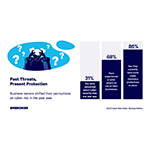New Report on Startups and Cyber Risk Explores Founder Perceptions on the Importance of Cyber Protection, Current Areas of Influence & Concern, and Key Investments for 2023
Data reveals cybersecurity decisions still a leading priority in the midst of challenging funding, operating environment for startups
SAN FRANCISCO–(BUSINESS WIRE)–Today Embroker, the digital platform making it radically simple to get business insurance, released a new report, the Cyber Risk Index: Startup Edition, based on a survey of 400+ VC-backed startup founders. The findings show that despite the significant economic headwinds startups currently face – from a challenging fundraising landscape to inflation woes and difficult operational decisions – founders remain pointedly focused on advancing their cybersecurity protections now, and moving forward.
Cybersecurity threats, concerns on the rise
Notably, survey results reveal that more than two-thirds (68%) of founders have experienced a cyber attack on one of their businesses – which may address why the majority (86%) of founders surveyed already have some cyber insurance protections in place. What’s more, they aren’t satisfied with their current level of protection – as 71% are considering additional cyber protections and tools for 2023. This further reiterates startups’ growing sense of urgency in curbing and proactively managing their cyber vulnerabilities.
Concern and awareness around cybersecurity is on-the-rise among founders, with nearly one-third (31%) more concerned about cybersecurity threats than a year ago. In addition, their expectations for the likelihood of facing a cyber attack rose from 36% in 2021 to 50% in 2022, representing a 14% uptick year-over-year.
Furthermore, data from Embroker’s shopped cyber policies – which saw a 50% increase from Q1 to Q2 in 2022 – also underscores how current events are driving real-time investment shifts. This uptick coincides with the increased coverage on the war between Russia and Ukraine, and concern over potential retaliatory cyber attacks from Russia on U.S. infrastructure and businesses.
Social influences drive decisions
The high percentage of startups with cyber insurance can partially be attributed to pressures from investors and/or board members, as nearly half (49%) cite cybersecurity insurance protections as required by one or both of these entities. However, it’s more than just internal factors driving founders to re-evaluate their cyber risk. External factors like global events are having a marked effect on the commercial insurance space as well. When purchasing cyber insurance, founders cite their decisions as most motivated by (a.) tensions around foreign relations (40%), (b.) media coverage on other company data breaches (35%), and (c.) managing a hybrid/remote workforce (32%).
Startups get serious about cyber insurance
A majority of startups have substantial cyber insurance coverage but are uncertain about how much risk is truly covered. Of founders that said their company has cyber insurance (86%), over 52% described their type of coverage as either “customized to our needs” or “the most comprehensive” package available. Yet, half of the startups with cyber insurance stated that their current policy would only partially cover their risk in the event of an attack or breach. Additionally, of those surveyed that lack cyber insurance, the number one reason cited for this was cost (44%).
“As the financial and reputational costs of dealing with cyber security incidents continue to increase, businesses large and small are decidedly incentivized to invest in their digital security and risk management strategy,” said David Derigiotis, Chief Insurance Officer at Embroker. “Insurance providers have been able to increasingly support clients with this effort through strategic partnerships with cyber security vendors and coupling policies with ongoing risk mitigation tools.”
Looking toward 2023 and beyond
As founders look forward to 2023, they are most concerned with impacts from inflation (32%), cyber attacks (27%), and supply chain challenges (26%). The top three “non-negotiable areas of investment” for the coming year are: product innovation (32%), cybersecurity protection (31%), and equipment upgrades (30%). This reinforces how focused founders are on better protecting and shoring up their company infrastructure and equipment.
To learn more about how startup founders are navigating the ever-changing cybersecurity landscape, download the full report here, or visit www.embroker.com.
Report Methodology:
For the Cyber Risk Index: Startup Edition 2022, Embroker surveyed over 400 VC-backed startup founders in the U.S. between November 10-14, 2022. The survey was completed online and responses were random, voluntary and anonymous. The report explores the importance of cybersecurity protections – including cyber insurance – to startups, how their perception on the reality of cyber risk is changing year-over-year, how they are protecting their businesses from modern external risks, and what factors most influence their decision-making.
About Embroker
Embroker is transforming commercial insurance by making it radically simple for businesses to get the right insurance at the best price. Embroker focuses on industry-specific coverage for the most complex and inefficient lines of insurance, such as Directors and Officers, Employment Practices Liability, Cyber, and Professional Liability. Embroker uses predictive modeling powered by proprietary technology to fully automate underwriting and make the buying process simple, fast, and more affordable. Through Embroker Access, Embroker provides partner agencies and wholesalers with the capability to offer all of Embroker’s industry-leading insurance products to their customers. Founded in 2015, Embroker is headquartered in San Francisco and has raised more than $140M in funding from leading Fintech and Insurtech investors. With a Net Promoter Score (NPS) of 70+, Embroker is also the highest rated business insurance company in the market.
Contacts
Caroline Traylor
104 West Partners
[email protected]





































